Among the causes of bronchial asthma, doctors assign a significant role to the state of immunity, the health of the respiratory system and the allergic component. Household dust, pet hair, food products, medications, and chemicals in the atmospheric air lead to pathological reactions from the immune system and, with a weakened protective function of the mucous membrane, create the preconditions for the formation of persistent changes in the bronchi.
Genetic predisposition or inheritance of asthma is a relative concept. Doctors always pay attention to the presence of close blood relatives with the specified diagnosis, but whether the disease develops in the descendants or not depends on many factors. The course of pregnancy, lifestyle, living conditions, dietary habits, environmental conditions and health status in general influence the pathogenesis of the disease.
Treatment
Regular cleaning of the home helps eliminate allergens and reduce the risk of developing asthma symptoms.
Therapeutic strategies used to treat asthma are aimed at effectively managing symptoms and preventing attacks. In addition, doctors help people reduce the amount of long-term lung damage that can develop when asthma is not well controlled.
The following therapeutic approaches are usually offered to patients with asthma.
Long-term treatment may include:
- long-term use of aerosol inhalers, including corticosteroids, combination inhalers and bronchodilators;
- taking allergy medications.
Your doctor may also prescribe quick-acting, short-acting medications, which include the following:
- oral or intravenous steroids to relieve swelling of the airways during severe attacks;
- fast-acting bronchodilators;
- short-acting beta-agonists, such as albuterol inhalers.
In addition, the doctor may advise the patient to make positive lifestyle changes to improve symptom control.
In particular, he can advise the following:
- identify and subsequently avoid triggers;
- use air conditioning systems to reduce indoor levels of pollen and other substances that trigger symptoms;
- use airtight covers for mattresses and pillows;
- refuse contact with pets;
- Clean your home regularly to avoid dust and mold (it’s best to do this at least once a week);
- cover your nose and mouth in cold weather;
- manage stress and strong emotions using relaxation techniques such as yoga and meditation.
Is asthma inherited?
Many parents who suffer from respiratory dysfunction wonder: is asthma inherited? After all, no one would want a child to suffer from asthma attacks.
A clear answer to this question can only be given by understanding the nature of this disease and the factors of its development.
Bronchial asthma is a severe chronic disease that provokes inflammatory processes in the respiratory tract.
Factors causing bronchial asthma
Attacks of bronchial asthma worsen most often at night. This leads to disruption of the central nervous system.
Difficulty breathing, wheezing and coughing are caused by various factors: dust, pollen, animal hair, household chemicals, viral infections. Asthma itself is a multifactorial disease.
Therefore, we can say with confidence that it is inherited.
Regular research into the causes of asthma is discovering more and more new factors. Today, aspects that influence the development of the disease can be divided into two groups: external and internal. Internal reasons include heredity, excess weight and the gender of the child. External ones include:
- Smoking;
- Profession;
- Allergens;
- Infections;
- Nutrition;
- Ecology.
Bronchial asthma and pregnancy
If a woman suffers from bronchial asthma during pregnancy, there is no need to panic. After all, this does not mean that the baby will also be sick. There is no 100% evidence that the disease is inherited. Therefore, the child has every chance to be healthy. To achieve this, the mother must monitor the condition of her body.
If a woman develops an initial form of bronchial asthma while carrying a baby, the fetus is not in danger. The restless state of the expectant mother can affect the development of the fetus.
Thus, excessive nervousness, frequent stressful situations, and insomnia can affect the child.
In turn, the chronic form of asthma can provoke:
- Difficulties in fetal development;
- Premature birth;
- The child's body weight is too low.
It is known that giving birth to a child prematurely leads to underdevelopment of the respiratory tract. The respiratory organs are poorly protected, so the baby may suffer from asthma and other types of allergies from birth.
To protect your child as much as possible, you need to create certain conditions for him. Firstly, this is breastfeeding. It is mother's milk that can restore and improve the functioning of the baby's immune system.
Secondly, the conditions in the house. The little one must be in clean conditions. Parents are required to carry out regular wet cleaning of the house.
So, steam kills all harmful chemicals left over from washing.
Psychosomatics
Sometimes asthma in a child is not at all associated with heredity, as is commonly believed. American scientists have found that if a baby does not receive proper attention, he begins to show the need for it in other ways. A baby's cry indicates that something is bothering him. The mother must respond to these calls and stay close to her baby.
If screaming is ignored or prohibited in the family, the baby does not receive due attention, affection and tenderness. He feels anxious and restless
Already at the subconscious level, his body begins to look for new ways to attract attention. Thus, a cough, runny nose, and wheezing develop, which quickly lead to bronchial asthma.
In this case, there is no need to talk about heredity.
If the cause of asthma in an infant is a psychosomatic factor, traditional medications for the disease will not bring any result.
And even if the baby receives the desired attention and care, the feeling of dissatisfaction on the part of the family is especially acute. So, again, on a subconscious level, the problem will periodically emerge again and again.
Can a baby be born with asthma if there is already an asthmatic in the family?

Answering the question whether asthma is inherited, we can answer in the affirmative. That is, if at least someone in the family has asthma, then the child’s risk of illness increases significantly. But doctors also point out that despite the fact that asthma is a hereditary disease, it can be avoided if you follow a number of important rules.
One of the first steps towards saving a child from asthma is the need to find out who in the family had this disease or suffered from other allergic diseases.
The question arises, what does allergy have to do with it? The answer from a medical point of view is very simple. For example, if the father suffers from a dust allergy, which manifests itself through a runny nose, then there is a possibility that the child will first develop eczema, and then, after a few years, asthma will begin. Thus, if a father receives an allergy and passes it on to his child, he may suffer from this disease all his life.
We recommend reading: Pancreaticoduodenectomy - PDR
It is also possible that asthma in an adult does not manifest itself immediately; for example, a father may develop asthma at the age of 40. This is all due to the fact that bronchial asthma may not appear immediately after birth, but after many years. And this all happens due to the fact that measures were not taken in time to prevent the occurrence of bronchial asthma in both children and adults.
It is very important for parents to know whether asthma is truly hereditary. Because if there is at least one asthmatic in the family, then you want to know how great the risk of illness in the newborn child will be. Statistics on this matter say that every year the number of children with asthma is increasing. Therefore, parents should already know in advance all the information that will help protect their child from bronchial asthma.
What kind of offspring does an asthmatic woman have?

A woman suffering from bronchial asthma can produce a healthy child if her attacks are minor. With a severe form of the disease, the situation will be more complicated. There is a possibility that the baby will be born weak and premature. In this case, there will be a high probability of repeating the fate of the mother and becoming asthmatic.
In order to prevent the disease, breastfeeding plays a huge role. It is advisable to feed a baby prone to bronchial asthma for at least 4–6 months. Mother's milk, avoiding allergens and following the correct regimen will help protect the child from developing this disease.
Among the negative factors that influence whether a child will be prone to bronchial asthma in the future, the key ones are the uncontrolled use of medications. It is desirable to exclude colds during pregnancy, but not always possible. Taking medications on your own, without a doctor’s prescription, is strictly prohibited.
The negative impact of tobacco smoke should not be underestimated. Even passive smoking affects the development and health of the unborn child. Cigarette smoke is one of the most powerful triggers of allergies and, as a result, asthma. Therefore, smoking is strictly contraindicated for pregnant women.
How to avoid passing on asthma if you have a predisposition
Preventive measures in the presence of a family history of bronchial asthma and allergic diseases are aimed at developing resistance to typical allergens. Household factors, food products and chemicals that have the ability to provoke the development of allergies are controllable and should be completely excluded from the child’s contact environment in the first three years of life. The course of pregnancy also affects the health of the unborn baby, so it is important for a woman to adhere to the principles of a healthy diet and lifestyle, eliminate bad habits and reduce the intake of allergens from the external environment.
Prevention of bronchial asthma with genetic predisposition:
- It is necessary to reduce the impact of household allergens, which will be helped by simple measures - daily wet cleaning and ventilation, destruction of mold and the fight against harmful insects, giving up bad habits and eliminating smoking indoors, timely cleaning of air conditioning devices, humidification and heating of air in the living room, prevention contact with pets.
- Food sources of allergies can provoke the development of asthma with a family history and should be excluded from the diet of a pregnant woman and child in the first years of life. Breastfeeding helps strengthen immune defense, and timely introduction of recommended complementary foods should be carried out in consultation with a doctor.
- Reducing the influence of exogenous factors, which play a significant role in hereditary predisposition to respiratory asthma, consists in eliminating the influence of household and industrial chemicals, tobacco smoke, pollen and synthetic fabrics on the child.
Measures to prevent asthma with a hereditary predisposition include timely detection and treatment of diseases of the respiratory and immune systems, refusal of arbitrary prescription of antibiotics without identifying sensitivity, optimization of the diet of pregnant women and newborns, as well as all types of immunoprophylaxis, including vaccination.
The initial manifestation of the disease - preasthma - is a reversible pathology and goes away with timely treatment, but can become permanent in the presence of additional risk factors and the absence of adequate therapy. If signs of bronchial asthma are detected in a child, it is necessary to undergo a full examination to determine the sensitization of the body, and also take all possible preventive measures to ensure that the disease becomes chronic.
Factors and causes of development of bronchial asthma
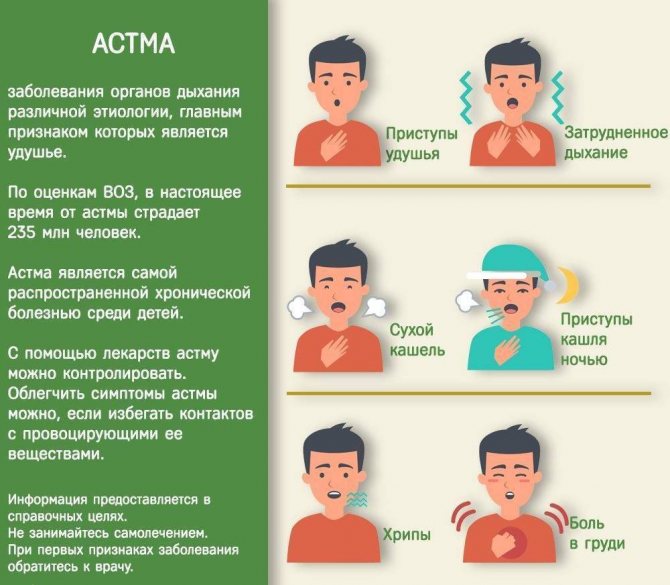
Asthma is considered a multifactorial disease. This means that many external and internal factors take part in its development. And in this case, heredity fades into the background.
You can even say that asthma is not inherited. As medical science develops, new sources are identified that influence the development of the disease. Among them, it is worth highlighting two main groups:
- External factors of direct influence.
- Physiological state of the body.
The first group is exogenous factors. These include provocateurs of an allergic reaction. This:
- molds, various products, plant pollen, animal hair;
- bacteria and viruses;
- harmful work in hazardous industries, frequent contact with irritating substances;
- ecological situation;
- smoking cigarettes;
- infectious diseases;
- poor nutrition.
The second group is endogenous factors:
- obesity of varying severity;
- bronchitis that occurs more than a few times a year;
- the presence of certain diseases in the mother or father;
- gender. If transmission of the disease occurs at the genetic level, it is most often from the mother.
Features of inheritance

It should be clarified that the transmission of predisposition to asthma on the part of women provokes a more severe course of the disease. If the gene was passed on by a man, then the symptoms will not be as severe, and the asthma itself will be much easier.
Of course, if parents suffer from bronchial asthma, then the risk of it developing in their heirs is high. But this is not 100%, because it is impossible to predict genetics. It is worth noting that the development of respiratory diseases is influenced by excessive hygiene.
This often happens when the child is small. Doctors say that if you wash your hands many times a day, especially with antibacterial soap, the natural microflora will be disrupted. The immune system will simply have nothing to fight against. For it to work well, it also needs pathogenic bacteria to activate it.
With excessive hygiene, the immune system will begin to react to any substances entering the body and give a reaction in the form of an allergy. Many people know that those children who are given more independence are less susceptible to bronchial diseases.
On the contrary, if you follow all precautions and constantly wash your hands, you can get sick. Everything is good in moderation, hygiene is something to worry about, but raising a child in sterile conditions is wrong
General factors of occurrence
The reason for the development of pathology is not genetics, but the presence of common factors in general, which indicates the multifactorial nature of the pathology.
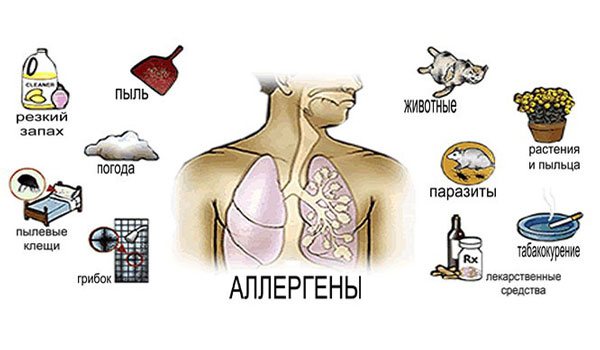
Allergens are the cause of the development of bronchial asthma
Every year medicine makes new discoveries that determine the process of the onset of the disease. The most popular of them are the following triggers:
- dust, mold, mushrooms, wool;
- bacteria and infections;
- tendency to develop illness due to contact with harmful substances;
- unfavorable environmental conditions;
- smoking;
- poor and unhealthy nutrition;
- excess body weight;
- respiratory diseases;
- presence of burdened heredity;
- gender predisposition – female.
Prevention of the development of bronchial asthma
With bronchial asthma, as with any disease, it is better to carry out prevention than to treat an advanced disease. An important aspect is to eliminate the impact of risk factors, because it is not possible to reduce the impact of congenital and internal factors.
An important key to preventing illness in a child is the pregnant woman's refusal to smoke. This bad habit should not be resumed after the birth of the baby, because the second important preventive measure is breastfeeding.
Preventive measures regarding bronchial pathology can be divided into 3 groups:
- Eliminating the influence of household allergens.
- Reducing the impact of external provocateurs.
- Minimizing the influence of other factors.
The first group of measures includes:
- regular wet cleaning and ventilation of the premises;
- elimination of cockroaches and fungal mold;
- parental cessation of smoking;
- periodic replacement of components of the air conditioning system.
The second group of prevention methods includes:
preventing plant pollen from entering the house during the flowering period; avoiding physical overload in the cool season or when the environment in the region of residence is poor; following a menu that does not contain allergenic products; careful use of medications (aspirin and non-steroidal anti-inflammatory drugs); timely influenza vaccination.
The third group of measures includes:
- timely treatment of concomitant ailments;
- compliance with weight standards;
- minimizing strong emotional manifestations.
IMPORTANT! Bronchial asthma is a fairly common pathology due to the fact that very often a person cannot avoid its development because he has a hereditary predisposition to this disease. Leading experts say that the disease is definitely not hereditary.
Only a predisposition to it is transmitted, which means that if you follow preventive instructions and medical recommendations, you can reduce the risk of asthma to a minimum
Leading experts say that the disease is definitely not hereditary. Only a predisposition to it is transmitted, which means that if you follow preventive instructions and medical recommendations, you can reduce the risk of asthma to a minimum.
The article was written based on materials from the sites: ingalin.ru, neastmatik.ru, zdorovie-legkie.ru, jmedic.ru, bronchial.ru.
How to prevent the development of asthma
If there is a genetic predisposition to a disease, there is a need for prevention. Activities should be aimed at eliminating the influence of triggers, since it is possible to minimize the impact of internal factors.
The main key to preventing pathology in a baby is the pregnant woman’s refusal of bad habits and a healthy lifestyle. Moreover, smoking is contraindicated even after the birth of a baby.
In general, asthma prevention measures fall into three categories:
- exclusion of household triggers;
- reducing the influence of external stimuli;
- minimizing all other possible causes.
- systematic sanitation of housing with ventilation;
- eliminating all possible insects in the house, preventing mold and mildew;
- smoking ban;
- replacement of air conditioner parts.

- preventing pollen and fluff from entering the home;
- exclusion of physical activity during cold seasons;
- compliance with hypoallergenic dietary principles;
- careful administration of pharmacological agents;
- timely influenza vaccination.
- treatment of concomitant diseases;
- maintaining normal body weight;
- exclusion of emotional outbursts.
The disease bronchial asthma is considered a fairly common pathology, since its occurrence often does not depend on the person and it occurs in early childhood. Parents are responsible for their children and must comply with all of the listed preventive measures.
Modern doctors claim that the disease is not inherited. There is only a predisposition to its development. This suggests that if all preventive principles are followed, the chances of developing pathology will be minimal.
Author of the publication: Anna Umerova
Among the causes of bronchial asthma, doctors assign a significant role to the state of immunity, the health of the respiratory system and the allergic component. Household dust, pet hair, food products, medications, and chemicals in the atmospheric air lead to pathological reactions from the immune system and, with a weakened protective function of the mucous membrane, create the preconditions for the formation of persistent changes in the bronchi.
Genetic predisposition or inheritance of asthma is a relative concept. Doctors always pay attention to the presence of close blood relatives with the specified diagnosis, but whether the disease develops in the descendants or not depends on many factors. The course of pregnancy, lifestyle, living conditions, dietary habits, environmental conditions and health status in general influence the pathogenesis of the disease.
Prevention measures
To prevent asthma from being inherited by the baby, the expectant mother must adhere to many preventive measures. First, avoid contact with any allergens:
Replace feather pillows and use only those that use synthetic material as filler.
- Avoid cosmetics (eye shadow, mascara, lipstick, etc.).
- Remove carpets and any objects that accumulate dust.
- Carry out wet cleaning daily.
- If there are animals in the house, give them to parents or relatives.
- Change bedding more often.
- Use only hypoallergenic intimate hygiene products.
In addition, to prevent asthma from being inherited, you need to follow a special diet (your doctor must tell you about it), and limit going outside when plants are flowering. If you can’t avoid going out there, after the hike you need to gargle and take a shower. Wear clean clothes
It is very important to stop smoking, drinking alcohol, do not forget to give yourself moderate exercise, and always carry medicine with you that will relieve an asthmatic attack.
The doctor should tell you how to properly use the inhaler and a device such as a peak flow meter. Remember, self-medication is a dangerous method of therapy! Treatment and diagnosis should only be prescribed by a specialist! If you follow preventive measures, receive proper and timely treatment, and get examined, asthma cannot but be inherited. Send your questions to our doctor. Do not hide the problem, it exists, immediately go to the hospital for diagnosis and subsequent therapy to avoid serious complications.
What to do to prevent your baby from getting asthma
If the mother of an unborn child has allergies, she should find out what substances her body reacts to with inappropriate inflammation, and avoid contact with them during pregnancy.
Long-term breastfeeding strengthens the baby's immune system well.
If parents suffer from allergies or bronchial asthma, the child needs to do an allergen test and, if possible, avoid contact with it.
- regular wet cleaning of the living space, preferably using a vacuum cleaner with a built-in water filter;
- do not provide soft toys for play;
- purchase bed linen with hypoallergenic artificial filler;
- place books in cabinets with doors;
- replace upholstered furniture or cover it with lint-free covers;
- if the air in your place of residence is heavily polluted, you should think about changing your place of residence;
- limit exposure to air during flowering plants; you can walk in the evening or after rain;
- during attacks after physical effort, reduce the child’s physical activity.
Constant close monitoring of the child’s condition and nutrition will allow you to understand which foods or contact with which objects cause shortness of breath or skin rashes. All these factors need to be addressed.
The concern of parents with bronchial asthma for the health of their unborn baby is justified. The risk of giving birth to a child who can get a serious incurable disease from their parents is high. But not all 100% of children receive such an inheritance from their parents; a thorough examination and compliance with all doctor’s recommendations before the baby is born gives hope for the birth of a healthy child.
Asthma as a way to attract family attention
In some cases, the development of the disease in a baby does not have any serious basis. The baby was born on time, there were no cases of pathology in the family, so what is it then? Is the child pretending?
As a rule, with the psychosomatic genesis of asthma, the baby actually has all the symptoms of the disease, which are confirmed by tests. The only difference is that simply taking medications does not give the desired effect. In this case, the child should be treated not only by a pediatrician and an allergist, but also by a psychotherapist.
Most likely, the baby wants to attract the attention of the family with his poor health. And although it is received, hidden irritation may emanate from adults, which still breaks out in their gestures and phrases
A new asthma attack on the part of a child is just another “punishment” of parents for insincerity.
Can all types of asthma be inherited?
Genetic predisposition increases the risk of developing asthma
Each type of disease in question may have a genetic component. In medicine, the following types of asthma are distinguished:
- adult-onset asthma;
- exercise asthma;
- allergic asthma;
- non-allergic asthma;
- occupational asthma;
- asthma with chronic obstructive pulmonary disease (COPD).
People with a family history of asthma are more likely to develop the disease. This means that asthma can be inherited. Some researchers emphasize that asthma may be more likely to be passed on from parents to children than other inherited disorders.
A study, the results of which were published in 2014 by the authoritative European Clinical Respiratory Journal, showed that heredity is responsible for approximately 70% of the risk of developing asthma, that is, genes have a significant influence on the occurrence of this disease in people .
However, it should be understood that genes are not the only cause. Asthma also develops in people who do not have close relatives with the disease. Additionally, some people with hereditary risks never experience asthma symptoms.
Heredity plays a less significant role in the development of asthma later in life, so adult-onset and occupational asthma are slightly less dependent on genes.
Sometimes asthma develops in people who do not have a genetic predisposition to it. In fact, there are many environmental factors that can cause this disorder.
Can a mother pass asthma to her child?
Pregnancy is a very responsible time. Each stage is important for the development of the unborn child. For example, during embryonic development the rudiments of future immunity are laid.
The ability to fight various kinds of viruses and microbes directly depends on which genes were involved. Since the child’s DNA contains the genes of the father and mother, he will inherit the problems equally.
Asthma can be inherited even if one of the parents is sick. These genes will already be in the DNA. The development of the disease depends on how many genes transferred from the carrier will take place in the gene structure of the embryo. Accordingly, the greater the number, the greater the predisposition.
Parents, of course, want to know whether their newborn has inherited a predisposition to asthma. If it is, then the child may have an attack of suffocation. Its appearance can be triggered by the following factors:
- transfer from breast milk to dry formula;
- start of complementary feeding;
- dust in the room;
- wool;
- pollen.
It happens that asthma does not manifest itself in any way until a person is very old. This suggests that although he had a high probability of getting sick, his immunity was very high. Therefore, the disease did not manifest itself for a long time. Over time, the protective function of the immune system weakens, and the person experiences the first attack of asthma.
To summarize, we can say that, like the father, the mother can pass on a predisposition to respiratory disease. But at the same time, the development of the disease can be stopped if preventive measures are followed.
The role of genetics in the development of asthma
Researchers have spent years identifying the underlying cause of this chronic disease. As a result, it was determined that many causes and genes are involved in the launch of the disease clinic. Thus, the body’s production of high specific compounds is hereditary.
According to genetics, excessive sensitivity of the respiratory system is transmitted, resulting in bronchial asthma. In addition, in many patients with this diagnosis, immune reactions are disrupted or specific components are created that cause inflammation.
After numerous studies of many families, a separate series of chromosomal layers were identified that are involved in the emergence of a tendency to the disease. But the persistence to identify specific trigger genes continues.
In addition to the genes that determine the chain of occurrence of the disease, there are genes that answer the question of which therapeutic tactics will be most effective for bronchial asthma and what course of treatment is required. In the process of studying genes, it is possible to study in detail the development of pathology and its causes.
Parents should know that the manifestations of the disease depend on the age of their child. So, the older the person, the more invisible the disease progresses. Among the adult population, the disease is more often diagnosed in females.
Pregnancy and asthma
It is known that asthma does not have a specific gene. This contradicts numerous decades of work that suggested that asthma is hereditary. Thus, a child may not inherit the disease from his father or mother and be born completely healthy, never experiencing symptoms of bronchial asthma in his life.
Pregnant women with this diagnosis in a mild form should not worry. Their baby will be completely protected, there will be absolutely no threat to his development, he will have every chance of being born on time and completely healthy.

But with a protracted course of the pathology, there is immediately a threat of the baby being born prematurely and problems with body weight are expected.
Also, in the course of numerous studies, it was found that the respiratory organs of such newborns are not protected, which means that the chances of developing an illness increase significantly. To prevent the development of bronchial asthma in infants, it is necessary to eliminate as much as possible all possible household triggers.
In addition, medicine knows situations in which the clinical picture of a disease in an infant serves as a tool for attracting the attention of adults. This question requires the additional involvement of a psychoanalyst.
Causes of morbidity in children
It is worth keeping in mind that genetics is far from the first cause of the symptoms of the disease. It is not the disease itself that is inherited, but only the tendency to it. This may be due to past infectious diseases, passive smoking, or irritating factors.
Thus, one of the serious household triggers is the presence of cockroaches in the apartment, a huge accumulation of dust, mold, and mildew. Children whose family history is characterized by a genetic predisposition to the occurrence of the disease should be in good living conditions, in a well-cleaned space, without the accumulation of dust, a huge number of books, soft toys and other rubbish.
When it comes to pet hair, researchers have not yet come to a consensus. Some experts conducted a test, as a result of which it was found that the baby’s contact with pets in early childhood will help develop an immune response and thereby prevent the development of the disease. Other studies, on the contrary, show the risks of developing clinical asthma in the presence of early contact with animals.
Genetic predisposition
Bronchial asthma is not a hereditary disease, like hemophilia, which necessarily occurs with a certain combination of genes in the genotype and is passed on to descendants from generation to generation. In this case, the peculiarities of the structure and sensitivity of the bronchi, the reactions of the endocrine and immune systems to certain stimuli are conveyed.
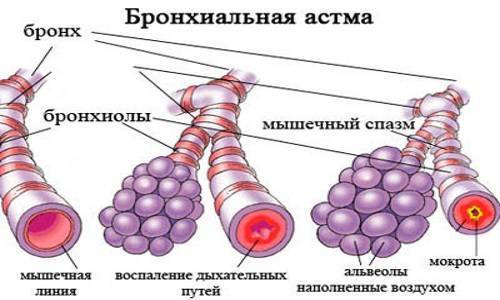
In all people, the smooth muscles of the respiratory tract are capable of contracting in response to irritation; coughing occurs as a defensive reaction, with the help of which we get rid of foreign bodies and mucus in the respiratory organs. For some, this reaction is excessive, causing a choking cough even for minor reasons, such as the smell of perfume or tobacco smoke. They are hereditary in nature and have special reactions of the immune system that lead to allergies. With the combination of these two internal factors and an unfavorable external environment (frequent acute respiratory viral infections, the presence of allergens, weakened immunity), chronic inflammation of the bronchi develops, leading to asthma.
Genetic prerequisites for the development of asthma
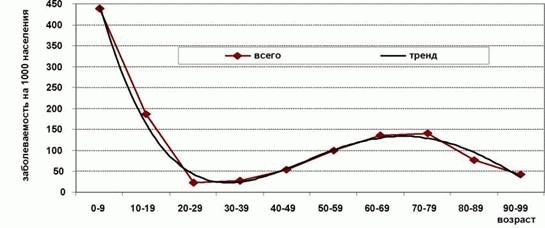
This was necessary to protect patients as much as possible from dangerous attacks of suffocation that occur during asthma and from other negative manifestations. Experts have proven that there can be several causes of asthma. Such reasons include the development of allergies that can cause suffocation, high tissue and cellular excitability of the respiratory system tract and bronchi.
In addition, patients suffering from this disease may experience disturbances in the functioning of the immune system, as well as problems associated with metabolism, which subsequently becomes the cause of the inflammatory process.

Statistics of mortality from asthma in the world
The most important factor in the study was a person’s genetic predisposition to the disease. This question was the main one for doctors, as they sought to identify the genes that provoke the development of the disease.
Unfortunately, no answer has been received so far. The results of one study confirmed the fact that bronchial asthma belongs to the category of infectious pathology, and other observations made it possible to determine that children born to parents suffering from the disease are more susceptible to the disease than their peers whose parents do not suffer from this disease.
Psychosomatic aspects in the occurrence of bronchial asthma
Symptomatically, an attack of bronchial asthma is associated with suffocation. The famous American psychoanalyst F. Alexander believed that the manifestation of the disease is based on the symbolic expression of an infant's cry.
For a baby, a cry is a signal to the mother that something is wrong with him. The mother, reacting to the cry, relieves the child of emotional stress and eliminates discomfort. Thus, the presence of the mother for the baby is in itself a positive stimulus.
If the mother does not give the baby the required reassurance, but, on the contrary, imposes a ban on screaming, then the child develops anxiety. On the one hand, the baby needs to be given a sign that something has happened to him, but on the other hand, he knows that this will cause displeasure in the mother. In this regard, a cry as a call can be replaced by other sounds: grunting, hissing, coughing, etc. In this way, the child tries to turn his mother’s rejection into overprotection (if he coughs, it means he’s sick) over him.
What professions are at risk?
People who have direct contact with allergens and external irritants are most often affected by the disease. These include:
- farm workers and veterinarians;
- workers associated with hazardous chemical production;
- hairdressers, jewelers, locksmiths;
- pharmacists and healthcare workers;
- manufacturers of rubber products, etc.

These people have a high risk of contact with highly allergenic products, which results in frequent diseases of the respiratory system, including asthma.
Sources
- https://stronglung.ru/astma/zarazna-ili-net-2.html
- https://bronchialnaya-astma.com/diagnostika/kak-zabolevayut-bronchialnoj-astmoj
- https://bronchialnaya-astma.com/diagnostika/peredaetsya-li-astma-po-nasledstvu
- https://pulmohealth.com/astma/zarazna-li/
- https://elaxsir.ru/zabolevaniya/astma/bronxialnaya-astma-zarazna-li.html
- https://neAstmatik.ru/astma/peredaetsya-li-po-nasledstvu.html
- https://AllergiyaNet.ru/zabolevaniya/astma/zarazna-li-astma.html
Genetic causes of bronchial asthma development

It is worth noting right away that asthma itself is not inherited. But the predisposition to it passes. If a parent is worried about whether bronchial asthma is inherited from parents, then we can say that the disease is influenced not only by a genetic factor. For a child to exhibit asthmatic symptoms, several conditions must be met:
- predisposition at the gene level;
- the presence of exogenous factors that influence the development of bronchial asthma.
To understand how parental genes influence the occurrence of the disease in children, geneticists constantly conduct research and also maintain statistical records.
A few statistics:
- In 10% of cases, children of absolutely healthy parents, without signs of bronchial asthma, can develop it.
- When the mother or father suffers from the disease, the disease can develop in 20% of cases. There is a 35% chance when both parents are sick.
- The situation becomes more complicated if the parents have allergic manifestations, and one of them is asthmatic. As many as 42% say that the child may inherit the disease.
- When both parents suffer from asthma, 75 out of 100 children will develop asthma. The disease manifests itself before the child’s seventh birthday.
Scientists have found which genes are responsible for predisposition to the development of bronchial asthma. There are more than 50 of them. They are located on the fifth and eleventh chromosomes. The task of these genes is to produce specific antibodies.
Why asthma is difficult to predict
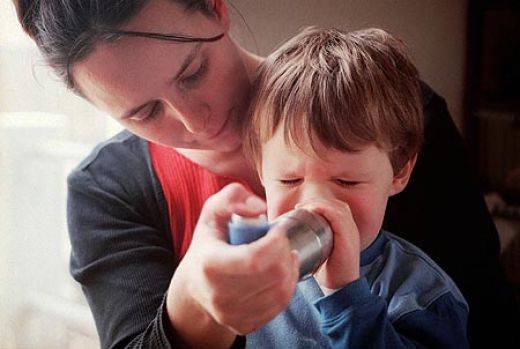
The disease is difficult to identify:
- Bronchial asthma can develop at different ages. It is more likely to appear in children under seven years of age. It also occurs in adults who did not respond to allergy symptoms, and it developed into asthma. You can also get sick in old age if you have a predisposition.
- The disease occurs against the background of internal factors. This could be an infectious disease, a cold, being overweight, or taking medications.
- Since the reactions of patients are individual, symptoms can only be classified approximately. Attacks in patients of different age groups occur differently, and the body’s reaction to the medications used is also different.
It is worth noting that manifestations of asthmatic disease with a hereditary predisposition can be prevented
To do this, you need to be careful even during the intrauterine development of the child, and after his birth, take preventive measures
Description of the disease, symptoms, causes
If we are talking about a chronic inflammatory disease of the human respiratory tract, which worries people at any age, then we are talking about asthma. This disease is most often diagnosed in children under ten years of age, as well as in the stronger half of humanity - men. Inflammation, which occurs in a chronic form, serves as an impetus for bronchial hyperreactivity, that is, it increases sensitivity to various environmental factors and causes spasms in humans.
As a result, an excessive amount of mucus is produced; due to swelling and spasms, thickening of the bronchial tube wall and narrowing of its lumen are observed. This picture of the disease does not allow for normal, sufficient gas exchange with the environment through the bronchus, which is in a narrowed state. It is this fact that causes repeated attacks of suffocation, coughing, shortness of breath, wheezing, manifested by whistling.
Main signs and factors causing asthma
Before you find out whether asthma can be inherited, you should familiarize yourself with the symptoms of the disease. Until the moment of an attack, a person is able to completely ignore whistling sounds when breathing, excessive sweating, and difficulty in exhaling air. In addition, asthma is manifested by soreness, a feeling of heaviness in the chest, anxiety, and a recurring dry cough. Often these symptoms bother the patient at night or in the morning, and can also occur during contact with provoking factors. These factors include:
- contact with allergens such as household dust, animal hair, pollen of certain plants;
- long-term physical activity (a striking example of this is running);
- interaction with allergens in the form of food (milk, chocolate, nuts and many others);
- medicines that are also often allergens.
Asthma can also show its symptoms against the background of a cold, any other respiratory viral disease, or when interacting with perfumes and various household chemicals. Often the above symptoms are caused by the patient inhaling cold air. It is worth noting that during an attack the person takes a comfortable position, which will facilitate the breathing process. He sits down, rests his hands either on the seat of the chair or on the table.
If asthma is severe, the patient will not have enough oxygen, so the fingers, toes, lips and tongue will become blue. Also, with this course of the disease, shortness of breath is observed, which does not allow you to clearly finish a sentence. Due to the fact that very little air moves through the respiratory tract, whistling sounds during breathing cannot be heard. A coma cannot be ruled out. Remember, it is very important to call an ambulance in time so that they can help save the person!









